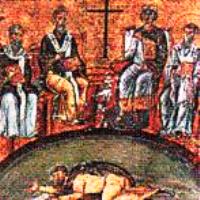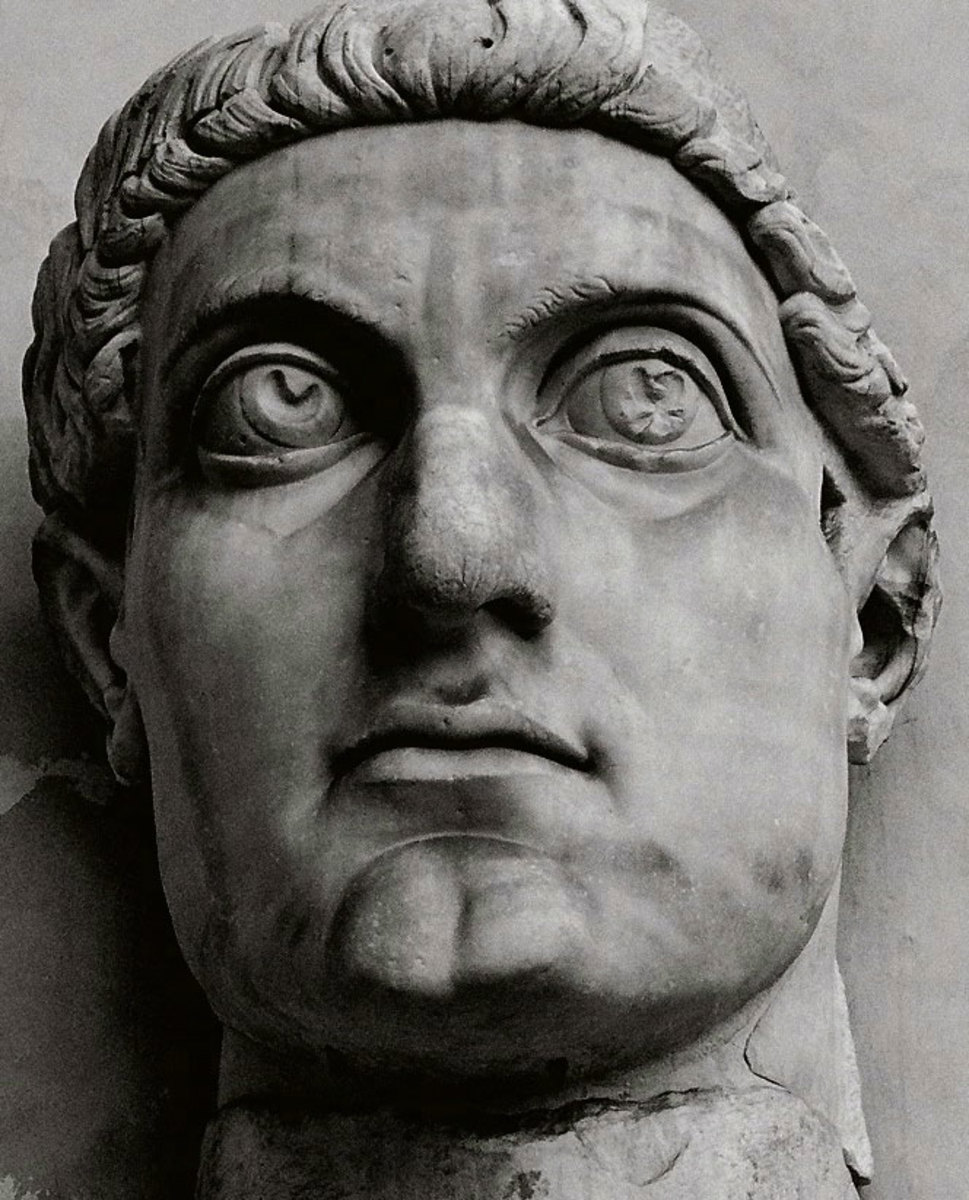Who Decided Jesus was God?

The 4th Century AD was an important one in the history of the Church, and of all Western civilization. The emperor Constantine ended official persecution of the Christian Church because he had, purportedly, become a Christian himself. He also called the first imperially-driven Church council to decide a matter of doctrine. It was at this council (the council of Nicaea) that the Church officially condemned certain teachings about Jesus that denied that he was fully God.
Especially with the relativelyrecent popularity of The Da Vinci Code, many have come to the idea that no one really thought Jesus was God before the time of Constantine and the council of Nicaea. Some have said that at the council of Nicaea, Christians debated about whether Jesus was just a man, a prophet, or whether he was God; claiming that no one had really thought he was God beforehand. Are these assumptions historically accurate?
In brief: No. Not even close.
Where did the idea of Jesus being God come from?
First and foremost, we can see clearly that the New Testament teaches that Jesus is fully God. Most scholars agree that the gospel of John, probably the last gospel to be written, was written at the latest at the end of the 1st century. Some scholars think much earlier.
This gospel makes the most explicit references to Jesus being God, so we will focus on it:
John 1:1: “In the beginning was the Word, and the Word was with God, and the Word was God.”
John 8:58: ““Very truly I tell you,” Jesus answered, “before Abraham was born, I am!” (NIV).
This use of ‘I am’ seems to be a reference to the Old Testament where God tells Moses that his name is ‘I AM.’ By saying this Jesus is saying, unequivocally, I am God.
So, we can at least say that by the end of the first century, Christians were teaching that Jesus was God – even if we assume nothing in the gospels was actually said by Jesus.
Later epistles in the New Testament make similar claims:
Titus 2:13: “while we wait for the blessed hope—the appearing of the glory of our great God and Savior, Jesus Christ” (NIV).
We know the epistles of the New Testament were written long before Constantine – other Christian writers make references to them for a couple of centuries before Constantine.
These are just a handful of the explicit references in the New Testament. There are many more. There are also implicit references, such as where Jesus is given titles (or himself claims titles) that in the Old Testament were reserved for God alone.
Early Christian theologians said the same thing (quotations from Learning Theology with the Church Fathers by Christopher Hall):
“Brothers, it is fitting that you should think of Jesus Christ as of God” –Clement of Rome (died either in 99 or 101 AD)
“For Christ is King, Priest, God, Lord, Angel, and Man.” –Justin Martyr (lived 100-165 AD).
“I pray for your happiness forever in our God, Jesus Christ.” –Ignatius (died, at the latest, 117 AD)
All of these writers lived 100-200 centuries before Constantine came to power.

What was the Council Really About?
The council of Nicaea (325 AD) was called because of a theological conflict that arose in the Egyptian city of Alexandria. A presbyter (what we would call a priest today) named Arius was teaching that the Son of God was not the ‘same substance’ as God the Father. Basically, he believed that God the Father had created The Son before the rest of the universe. This Son had assisted God in the creation of the world (he is ‘the Word’ mentioned in John 1, the followers of Arius and others agreed). No Christians, including Arians (followers of Arius), in the 4th century were saying that Jesus was not in some sense divine. Both the Arians and those opposing them all agreed that he was a divine being, existing before the rest of the world. The question being argued about at the council was whether he was actually the exact same being as God. Was he completely, fully, God?
This idea of Arius’ was condemned at the council of Nicaea. At first this decision was not very popular among many Christian leaders. Many would remain Arian for several decades and even centuries. There were others, however, who were caught in the middle. Many who probably disagreed with Arius were still unhappy with the language used in the Council’s decisions because the word the council finally used to describe the relationship between The Father and The Son (the Greek term ‘homousios’ – meaning the same substance) had connotations from being used by earlier heretical groups, namely Sabelianists. These folks went too far the other direction and argued that there was no distinction between God the Father and God the Son – that God was just one person with different ‘masks’ or ‘manifestations.’
What the Christians were trying to articulate, and eventually would articulate, was that Jesus was The Son incarnated – and that the Son was fully the same being as God but a distinct person within the same being. This was the beginning of the articulation of the doctrine of the Trinity: God is three persons in one being. This is a complicated and mysterious idea for us to make sense of – but just because it is complicated and unusual from our cultural perspective is no reason to be unfair to their beliefs. The idea that Jesus was God was not a new idea in the 4th century and not inconsistent with the earliest teachings of Christianity.
Athanasius
A man named Athanasius became the bishop of Alexandria after the council of Nicaea. He is known as one of the most vocal defenders of the doctrine that was developed at Nicaea and in publicly critiquing Arius’ views. His famous writing, On The Incarnation of the Word of God is a classic of Christian theology. If you want to read this work and see for yourself what kinds of theological arguments were being made, you can read it here: http://www.spurgeon.org/~phil/history/ath-inc.htm
In Conclusion...
The idea that a few random bishops and politicians, much less Constantine, arbitrarily decided that Jesus was God in the 4th century is just plain unhistorical. You don’t have to believe in Christianity to see this. The idea that Jesus was God has a long history dating back to the very beginnings of Christianity and that the arguments in the 4th century at the council of Nicaea were over the nature of Christ’s relationship to God – not whether he was a mere man or not. At the very latest, the idea that Jesus was God existed at the end of the first century – 70 years after Jesus’ death. And there is plenty of good evidence suggesting that it is earlier, but that is a discussion for another time. And if we believe that any of the statements in the gospel of John were actually spoken by Jesus (which I do believe), it is clear, then, that the idea started with Jesus himself.








